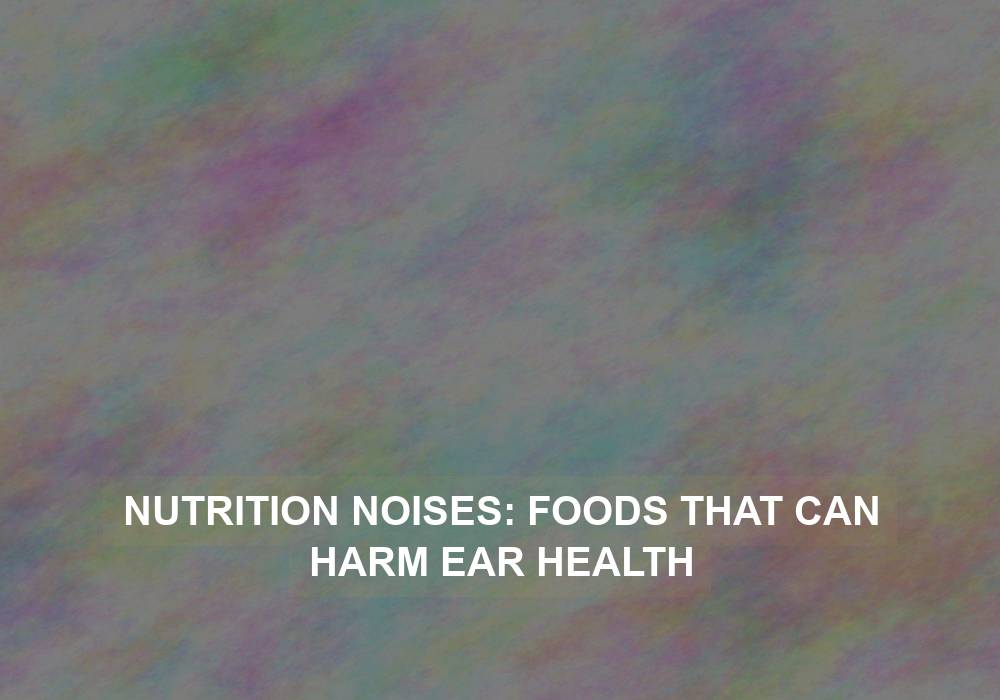Our ears are not only essential for hearing, but they also play a crucial role in maintaining our overall balance. While we often focus on protecting our ears from loud noises and infections, we may overlook the impact that our diet can have on our ear health. Just as certain foods can benefit our hearing, there are also foods that can harm our ear health. In this article, we will explore some of these foods and how they can potentially damage our ears.
1. Excessive Salt Consumption
Salt is a staple ingredient in many cuisines around the world. While it adds flavor to our meals, consuming excessive amounts of salt can have a negative impact on our ear health. High salt intake can lead to fluid retention in the body, including the delicate tissues of the inner ear. This fluid buildup can disrupt the proper functioning of the inner ear, potentially leading to hearing loss and balance issues.
To reduce your salt intake, try to limit processed and packaged foods, as they often contain high levels of sodium. Instead, opt for fresh, whole foods and use alternative herbs and spices to enhance the flavor of your meals.
- Be mindful of your salt intake and read food labels to identify high-sodium products.
- Substitute salt with herbs and spices like rosemary, thyme, and garlic powder to add flavor to your dishes.
- Increase your intake of potassium-rich foods like bananas, oranges, and spinach, as they can help counterbalance the negative effects of sodium.
2. Sugary Foods and Beverages
Excessive consumption of sugary foods and beverages not only affects our overall health but can also have detrimental effects on our ears. Studies have shown that a diet high in sugar can increase the risk of developing age-related hearing loss. The high sugar levels in our bloodstream can damage the blood vessels in the ears, leading to reduced blood flow and compromised hearing.
To protect your ear health, limit your intake of sugary snacks, soda, and other sugary beverages. Instead, choose healthier alternatives like fresh fruits, unsweetened teas, and water.
- Opt for natural sweeteners like honey or maple syrup instead of refined sugars in your recipes.
- Incorporate more fiber-rich foods like whole grains, vegetables, and legumes into your diet, as they can help regulate blood sugar levels.
- Consider regular dental check-ups and good oral hygiene practices, as poor dental health can also contribute to hearing problems.
3. Trans Fats and Saturated Fats
Trans fats and saturated fats have long been associated with various health problems, including cardiovascular diseases. However, recent research has also linked these unhealthy fats to an increased risk of hearing loss. Trans fats and saturated fats can cause inflammation throughout the body, including the blood vessels in the ears. This inflammation can restrict blood flow to the ears, leading to hearing damage.
To avoid trans fats and saturated fats, steer clear of fried and processed foods. Instead, opt for healthier fats found in foods like avocados, nuts, and fatty fish such as salmon.
- Choose cooking methods like baking, grilling, or steaming instead of frying to reduce your intake of unhealthy fats.
- Incorporate omega-3 fatty acids into your diet by consuming foods like flaxseeds, chia seeds, and walnuts. These fatty acids have anti-inflammatory properties that can benefit your overall health, including your ear health.
- Practice portion control and moderation when consuming high-fat foods, as excessive intake can still be detrimental to your health.
4. Caffeine and Stimulants
While a cup of coffee or tea can provide a much-needed energy boost, excessive consumption of caffeine and other stimulants can have negative effects on our ears. Caffeine is a diuretic, which means it can increase urination and potentially lead to dehydration. Dehydration, in turn, can affect the delicate tissues in the ears and impair their proper functioning.
To maintain good ear health, it is important to stay hydrated by drinking plenty of water throughout the day. Limit your intake of caffeinated beverages and opt for herbal teas or water instead.
- Aim to drink at least 8 glasses of water per day to keep your body hydrated, including your ears.
- Stay mindful of your caffeine intake and consider switching to decaffeinated versions of your favorite beverages.
- Increase your consumption of water-rich foods like watermelon, cucumbers, and celery, as they can contribute to your overall hydration levels.
5. Alcohol
Moderate alcohol consumption is generally considered safe and may even have some health benefits. However, excessive and prolonged alcohol use can have detrimental effects on our ears. Alcohol is known to cause inflammation and damage to the delicate hair cells in the inner ear, leading to hearing loss and balance issues.
To protect your ear health, it is important to consume alcohol in moderation. If you choose to drink, do so responsibly and be aware of the potential risks to your hearing.
- Limit your alcohol intake to moderate levels, which is defined as up to one drink per day for women and up to two drinks per day for men.
- Stay hydrated when consuming alcohol by alternating alcoholic beverages with glasses of water.
- Consider taking breaks from alcohol consumption to give your body and ears a chance to recover.
Conclusion
Maintaining good ear health goes beyond protecting our ears from loud noises and infections. Our diet plays a crucial role in preserving the health of our ears. By avoiding excessive salt, sugar, unhealthy fats, caffeine, and alcohol, we can minimize the potential harm to our ear health. Instead, opt for a balanced diet rich in fresh fruits, vegetables, lean proteins, and healthy fats to support optimal ear function and overall well-being.
Note: This article is for informational purposes only and should not be taken as medical advice. If you have concerns about your ear health or any other medical condition, please consult with a healthcare professional.
